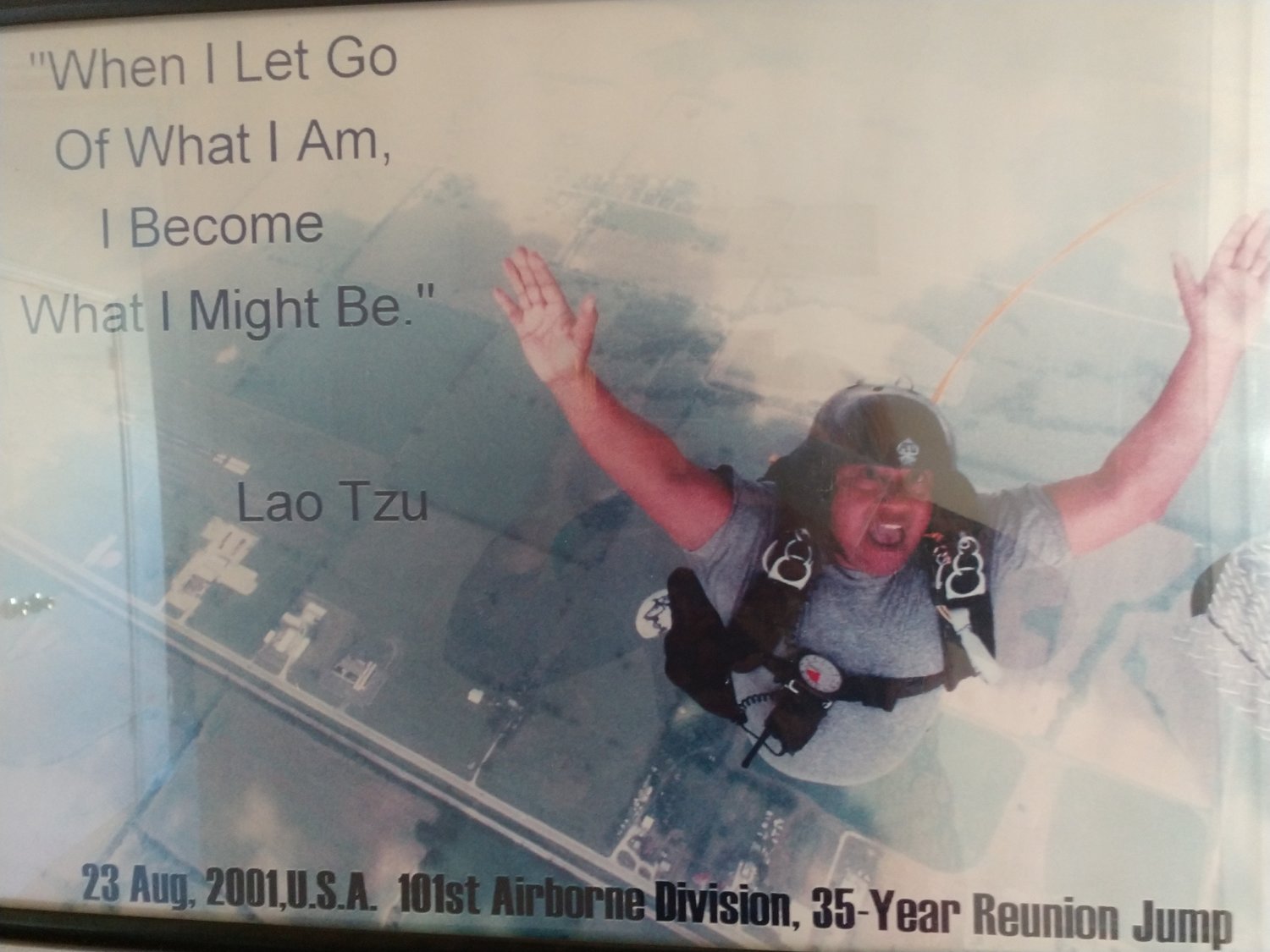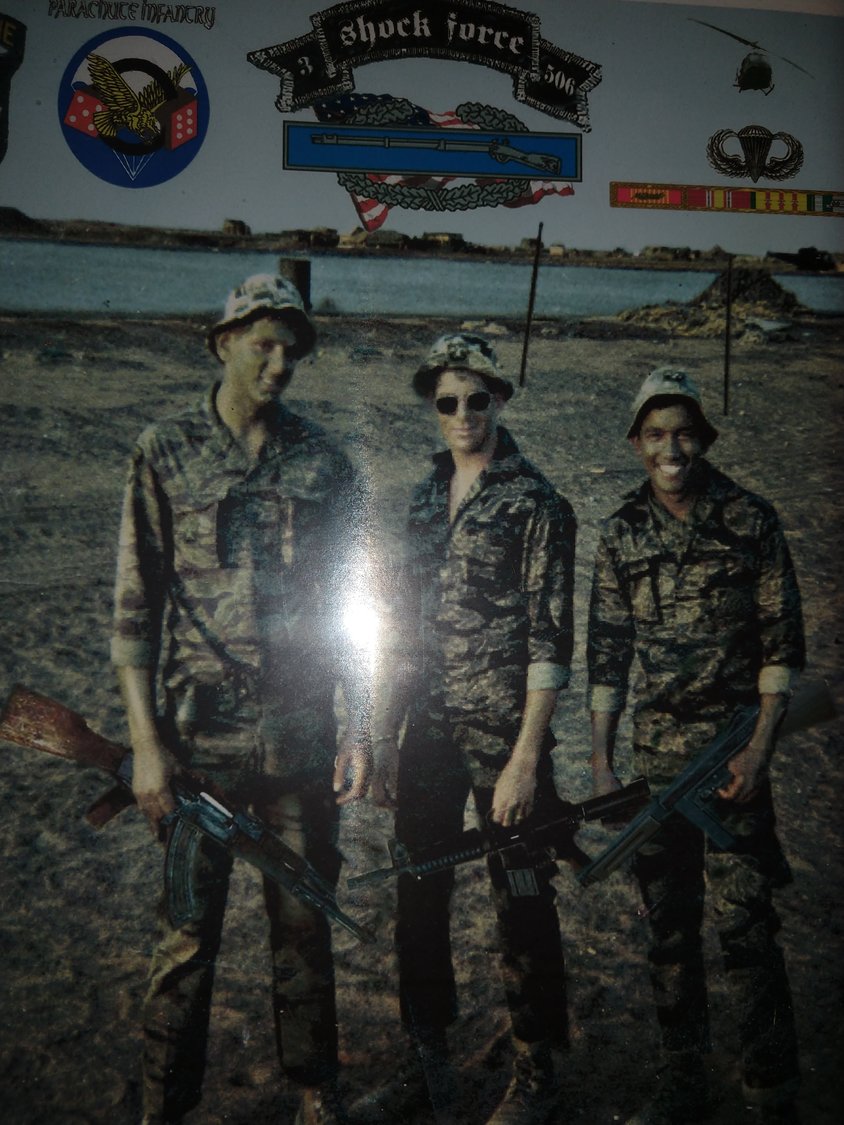To hell and back: the story of Henry Salas in Vietnam
I think now, looking back, we did not fight the enemy—we fought ourselves.
And the enemy was in us.
The war is over for me now, but it will always be there the rest of my days as I’m sure Elias will be, fighting with Barnes for what Rhah called possession of my soul. — Chris Taylor, Platoon
There are times in life that good men have to do extraordinarily unthinkable things for the good of their country, their comrades and their own survival.
Such was the case 50 years ago for young Henry Salas in the jungles and Central Highlands of South Vietnam during the Vietnam War. He was a Long Range Reconnaissance Patrol (LRRP) squad leader for the Screaming Eagles of the 101st Airborne Division at the height of Vietnam before, during and after the Tet Offensive. This is Henry’s story.
He was born in San Antonio, Texas on Oct. 10, 1947, the son of Henry and Ramona Salas. He was the oldest of seven Salas children (brothers Richard, Monico and Freddy; sisters Lola, Julia, Jane and Jessica), and loved to swim and fish while growing up.
“We would go fishing and swimming in the San Antonio River,” Salas said. “We were always doing something outdoors.”
As he got older, Salas attended Luther Burbank High School where he was a member of the football team.
“I played varsity football for three years,” Salas proudly stated, then jokingly added: “but I was too small to play on the field, so they made me the holder for extra points and field goals. I got a varsity jacket, and all the girls who I might have had an interest to go out with were more interested in being able to wear my jacket. I quickly lost interest in any of that.
“I was hoping I might get a scholarship or a chance to play in college, but nobody gives out scholarships for holders,” Henry laughed.
While football, fishing and swimming were important things in Henry’s young life, he grew up in a family that has given extraordinary military service to our country. His father and his uncles had all served in World War II and/or Korea, and he overheard lots of stories of military duty, service and sacrifice.
“I grew up interested in the Army, especially the 82nd Airborne, because my father always spoke with such reverence of those men,” Salas said. “In my civics class in high school, my teacher looked around the class one day and told all of us ‘within one year, all of you will be serving in Vietnam.’ That really hit home. We all knew we were going to have to either go to college or we were going to Vietnam.”
Henry and his good childhood buddy Andy Guiterrez decided to sign up together under the Buddy System to go to war together in the United States Army. Guiterrez, however, got into college and Salas was on his own in 1966 when he entered the Army. Guiterrez later served in the 9th Infantry later in the war.
“My father said, ‘You’re going to have to go anyway so you might as well get started and get it over with,’” Salas said. “So the very next day after graduation, June 24, 1966, I was on an airplane and headed to Ft. Polk in Louisiana for basic training.”
After eight weeks of basic, Salas came back to San Antonio for a few weeks. He came back a different person.
“I had a hard time identifying with everyone when I came home for those two weeks,” Henry recalled. “Some of my friends were against the war and were pretty vocal about. Other friends told me to take care of myself. I knew then that I had to do what I needed to do to take care of myself.”
Salas was off to Ft. Gordon, Ga. and spent eight weeks in advance infantry training. At the end, he was selected to join the Army Airborne, something he is proud of to this day.
“My training buddy and I got our orders at the end Advance Infantry Training,” Salas said with a smile. “They pointed at him and said 82nd and then pointed at me and said 101st. I was initially disappointed but the 101st Airborne was where I made my home.”
Salas was off to Ft. Benning for jump school, and he loved it. He did his five jumps which qualified him for his wings, but he would volunteer whenever needed to fill The Stick in order to fulfill requirements for other jumps. He was assigned to do administrative typing duties in the 101st because he knew how to type, but that isn’t what he wanted to do in the Army.
“I went to a non-com and told him I wanted to transfer to more active duty,” Salas said. “He told me I had soft duty, and if I transferred, I would definitely be going to see action in Vietnam. I told him I wasn’t doing what I was trained to do and wanted combat. Then he told me they were looking to start a new outfit called Shock Force. It would be two platoons of 4 LRRP teams with each team having six members.
“I immediately volunteered and was accepted into Shock Force of the Third Battalion of the 506th.”
Before going to South Vietnam, Shock Force received training at Ft. Campbell, Ky., the Great Smoky Mountains, and in the swamps of Lake Okeechobee to simulate fighting in Vietnam. He received cross training in communications and as a medic, as all members of the LRRP team were cross-trained in case someone was wounded or killed in action.
In September 1967, 19-year old Henry Salas landed at Phan Rang, South Vietnam, the home of the 3/506 of the 101st Airborne.
“Our job as a LRRP team was to go out on patrols into the jungle or countryside, find the enemy, engage them in a firefight, and then call in Reactionary Force teams to our LZ and fight and destroy the enemy,” Salas said. “I was the leader of our squad, and I took my responsibility very seriously. I didn’t want my team members killed because of my decisions or actions.”
Salas said there were times his LRRP team would go on patrol for ambush or to seek out the enemy but did not see any action. Those times were the exception.
“Yes, we were scared and nervous, but surprisingly it was a relief when we ran into them,” Salas said. “Once we made contact we knew where they were and we didn’t have to worry if we were going to be the ones who were ambushed. If we saw them first I could make the determination if we needed to pull ourselves out of an impossible situation or if we could inflict serious damage on them while we waited for the Reactionary Force. It usually took 15 to 20 minutes for them to come, so we had to have everything covered while we slugged it out with the VC or NVA.”
“I’ll never forget one time when we bumped into the NVA,” Salas said. “Bullets were flying all around and it was really hot. I was really worried about getting out of that one when the relief choppers came in. When we got into the choppers and started flying above the tree line I looked down and all I could see it looked like a colony of ants advancing on where we were. They were NVA soldiers and from the air it looked like we had run into a whole NVA battalion—which it probably was. It was just before TET in 1968.”
There were lots of firefights, and Salas saw men get wounded and even die. It hardened him to life around him.
“Honestly, with men’s lives in your hands you start to take yourself too seriously,” Salas said as he remembered those days. “I thought I was God! I made decisions about life and death and who lived and who would die. I thought I was God. The things we had to do to survive will never leave me, and I have only come to terms with it after years of thinking and reliving those moments.”
Salas served a full year hitch in Vietnam, and then re-upped for another six months of hell.
“There was nothing to come home to,” Salas said. “All the papers were filled with anti-war stories and after what we were all going through over there, I didn’t want to come home.”
Salas spent his 18 months in South Vietnam fighting a struggle for life and death in the jungles, highlands and rice patties of that country. In January 1969, he finally got orders to come home. On the flight home, the man who felt he like he was God had an epiphany.
“I went to sleep on the plane and had some horrible nightmares—reliving things we had seen and done,’’ Salas said. “It was on that flight home that I made peace with my God. I vowed to him on that flight that I would never hurt another human being again.”
He was true to his word. When his plane landed in the San Francisco Bay area, Salas was greeted in the airport by anti-war protesters who spit on him and called him a baby-killer. A woman cursed him and said, “I hope your sons and daughters don’t survive!” Salas just grabbed her hand and all that he could think of to say was, “Your hands are warm,” and walked away.
After returning to civilian life, Henry spent a few years wandering around Mexico trying to reconcile his life in Vietnam. He recalls sitting on top of the Pyramid of the Moon in Mexico City and meditating on the meaning of life and trying to rid himself of all his negativity. He eventually came back to the States and started school at the University of Texas - San Antonio.
Through a series of remarkable coincidences, Salas eventually made his way into the mental health field. For over 20 years he worked at facilities that helped everyone suffering from depression, drug addiction, alcoholism and other maladies. While watching how patients were treated by therapists, Salas came to the realization that he was getting free therapy to help him deal with and cope with the war years.
He is a changed and blessed man because of it.
“I learned so much during that time, it really helped me with a lot of different things,” Salas said. “Over time, I learned it is so important to build relationships and support systems, and that is how I think today. Those years may have saved my life.”
But there are times since I felt like a child born of those fathers.
Be that as it may, those of us who did make it have an obligation to build again and teach to others what we know and to try with is left of our lives to find a goodness and meaning to this life. Chris Taylor, Platoon.
Today, the warrior named Henry Salas is a kind and gentle soul who is admired and loved by many.
Salas married his wife Lori 28 years ago, and he has two children named Jerry and Jackie. He has 11 grandchildren.
He recently retired as the Executive Director of the Community Health Centers of South Central Texas.
Comments










